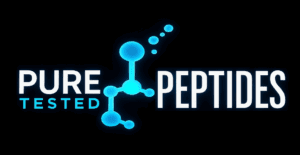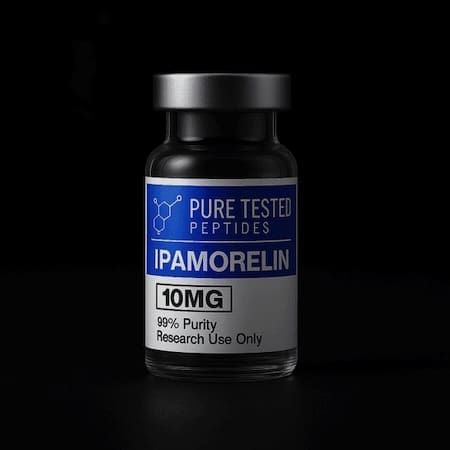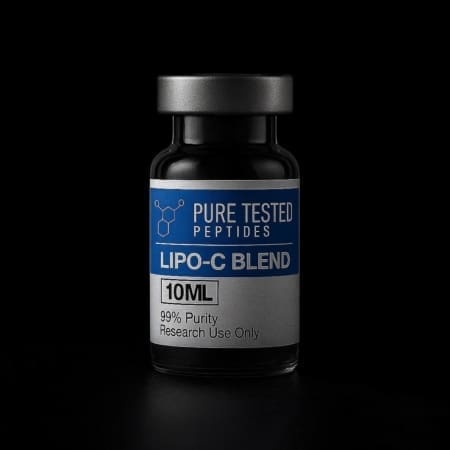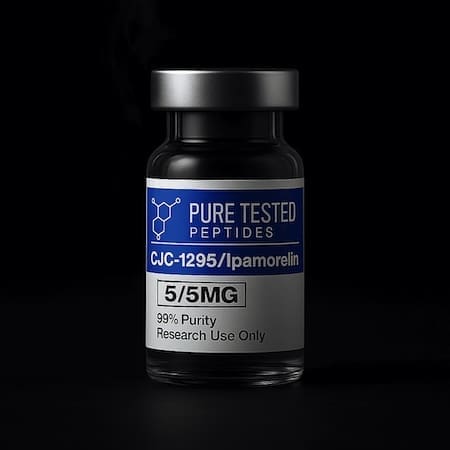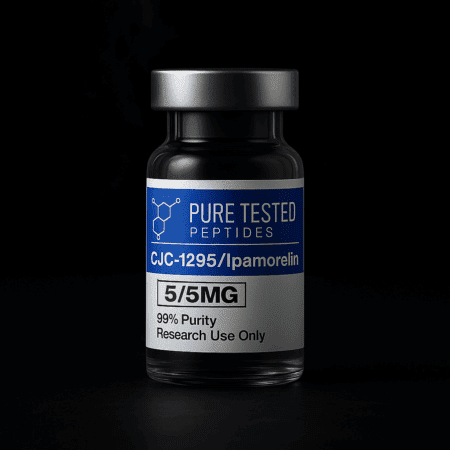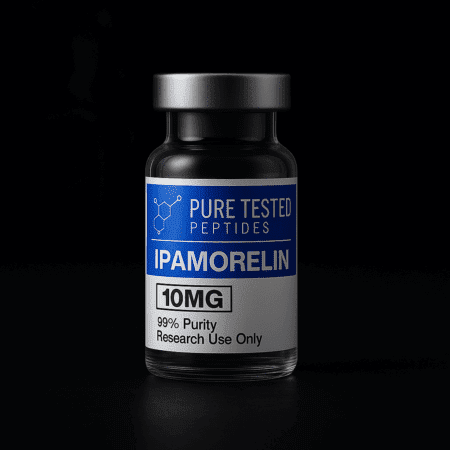Ipamorelin is a selective growth hormone secretagogue (GHS) and ghrelin receptor (GHS-R1a) agonist studied for its capacity to promote pulsatile release of growth hormone (GH) from the anterior pituitary while showing minimal activity at ACTH or cortisol pathways in comparative models. In preclinical and clinical research settings, Ipamorelin 10mg (often referenced as Ipamorelin-10-mg for SKU clarity) is used to explore endocrine dynamics, body composition markers, sleep architecture correlations with GH pulses, and recovery-oriented biomarkers such as collagen synthesis or nitrogen balance. Distinct from earlier secretagogues, ipamorelin exhibits a favorable selectivity profile, making it a frequent comparator in investigations alongside growth hormone–releasing hormone (GHRH) analogues such as CJC-1295 and its shorter-acting variant commonly referred to as “CJC without DAC” (i.e., Mod GRF (1-29)).
Conceptually, ipamorelin amplifies the amplitude and/or frequency of physiologic GH pulses by acting at the pituitary via the ghrelin receptor, whereas GHRH analogues primarily stimulate the somatotrophs through the GHRH receptor. Because these two pathways are synergistic, co-administration in research models may yield additive effects on GH area under the curve (AUC), pulse height, and downstream IGF-1 exposure, while preserving physiologic pulsatility compared with continuous GH infusion. The degree of synergy appears to depend on the pharmacokinetics of the GHRH analogue selected: CJC-1295 with DAC extends half-life and can produce a higher and longer IGF-1 exposure, while “CJC without DAC” (Mod GRF (1-29)) has a shorter half-life that more tightly adheres to natural pulse timing paradigms favored in some endocrine studies. Accordingly, the research question—e.g., acute pulse augmentation vs. sustained IGF-1 elevation—often determines whether investigators explore ipamorelin alone, pair it with CJC-1295 without DAC to prioritize pulsatility, or evaluate the longer-acting DAC-bearing CJC-1295 for exposure-time outcomes.
Mechanistic Overview
Ipamorelin alone. In endocrine models, ipamorelin binds GHS-R1a on pituitary somatotrophs, facilitating calcium influx and GH vesicle exocytosis. It can increase GH pulse amplitude with comparatively limited corticotropic spillover versus legacy secretagogues. Investigations often evaluate ipamorelin’s impact on GH pulsatility metrics (inter-pulse interval, pulse height), downstream IGF-1 changes, and surrogate markers such as collagen synthesis and protein turnover. Because GH is secreted in ultradian pulses tied to sleep and circadian regulators, the timing of ipamorelin exposures in research can influence outcomes, including nocturnal GH peaks and recovery-related markers.
Combination with GHRH analogues. When paired with a GHRH analogue, ipamorelin engages a complementary receptor pathway, leading to supra-additive GH release in several models. CJC-1295 without DAC (Mod GRF (1-29)) is often explored when the objective is to enhance physiologic pulses (shorter half-life, sharper peaks), whereas CJC-1295 with DAC prolongs exposure, typically elevating basal IGF-1 for longer windows. Choice of analogue shapes endpoints: short-acting combinations are favored in protocols emphasizing pulsatility and recovery biology; longer-acting options skew toward sustained IGF-1 exposure, potentially affecting lipid and glucose markers differently. Across designs, synergy is framed by: (1) receptor crosstalk, (2) timing of administrations relative to endogenous pulse generators, and (3) total exposure (AUC) vs. pulse quality trade-offs.
Researchers comparing SKUs often reference exact SKUs to maintain reproducibility and inventory clarity. For investigations centered squarely on ipamorelin-only dynamics, many labs specify vial content as Ipamorelin 10mg (Ipamorelin-10-mg) to keep terminology consistent across protocols and to align with inventory pick-lists used in LIMS.
Ipamorelin vs. Ipamorelin + CJC-1295: What Studies Tend to Measure
Endocrine biomarkers. Core outcomes include GH pulse metrics (frequency, amplitude), 24-hour GH AUC, and IGF-1 changes. Combination arms typically report greater GH peaks and/or higher IGF-1 exposure compared with monotherapy, but the pattern varies by whether the GHRH analogue is short-acting (no DAC) or long-acting (with DAC). Short-acting pairings may preserve discrete pulses—useful when the hypothesis emphasizes physiologic signaling—while long-acting CJC-1295 may favor smoother, extended exposure.
Body-composition and recovery markers. Preclinical and exercise-adjacent models sometimes evaluate nitrogen balance, lean mass proxies, collagen synthesis markers (e.g., P1NP), and soft-tissue turnover indices. While GH/IGF-1 pathways can affect these markers, outcomes are driven by study design, exposure timing, and the interaction of GHS and GHRH signaling with sleep and nutritional state. Consequently, direct head-to-head conclusions require careful attention to protocol specifics rather than blanket assumptions.
Metabolic readouts. Investigators also monitor fasting glucose, lipid panels, and insulin sensitivity surrogates to contextualize IGF-1 exposure patterns. Ipamorelin monotherapy generally serves as a selective pulsatile stimulus, while combinations—especially with long-acting CJC-1295—may increase total exposure time, which can influence metabolic endpoints differently. These differences underscore why some protocols prefer Buy CJC without DAC as a keyworded shorthand for designs seeking sharper pulses through Mod GRF (1-29) rather than a prolonged DAC-mediated effect.
With DAC vs. Without DAC: Why the Distinction Matters
CJC-1295 without DAC (Mod GRF (1-29)). Shorter half-life, tighter pulse windows, and frequent pairing with ipamorelin in studies focused on reproducing physiologic GH rhythms. This route is often chosen to emphasize GH pulsatility, aligning with hypotheses about tissue-specific signaling that relies on peaks rather than plateaus.
CJC-1295 with DAC. Prolonged half-life through albumin binding can yield higher/longer IGF-1 exposure. In combination with ipamorelin, this can create mixed profiles—sharper peaks from ipamorelin layered on a higher baseline from CJC-1295 DAC—useful for experiments centered on time-under-curve hypotheses. However, if strict pulsatility is the goal, many designs lean toward the without-DAC option to avoid flattening the GH rhythm.
Design takeaway. If the research question centers on “peak-dependent signaling,” protocols often explore ipamorelin plus CJC-1295 without DAC. If the question emphasizes “exposure-dependent outcomes,” ipamorelin plus DAC-bearing CJC-1295 can be considered. Across both, ipamorelin’s receptor selectivity and synergy with GHRH analogues remain the mechanistic backbone.
For combination-arm reproducibility, many researchers standardize on clearly labeled vials. When documenting a dual-pathway protocol, a descriptive option is Buy Ipamorelin/CJC1295 (5 mg / 5 mg), which makes inventory pairing explicit for audits and write-ups while aligning with typical LIMS descriptors.
Frequently Asked Research Questions (FAQ)
Does combining ipamorelin with CJC-1295 always outperform ipamorelin alone?
Not categorically—outcomes depend on endpoints. For maximal GH pulse height with preserved rhythm, short-acting CJC-1295 without DAC plus ipamorelin is often tested. For sustained IGF-1 exposure, DAC-bearing CJC-1295 may be paired with ipamorelin. Study timing, sampling windows, subject characteristics, and nutritional/sleep control meaningfully affect results.
How do researchers word their sourcing notes for reproducibility?
Many labs include SKU-level precision and anchor phrases like “buy pure peptides online” or “buy ipamorelin online” strictly to note supplier provenance and catalog matching. This improves repeatability across sites and time, particularly when LIMS IDs and product slugs (e.g., Ipamorelin-10-mg) are used.
Is “Buy CJC without DAC” the same as Mod GRF (1-29)?
In common research shorthand, “CJC without DAC” typically refers to Mod GRF (1-29), a short-acting GHRH analogue. Investigators use this phrasing to emphasize pulsatility-focused designs. Exact composition and labeling should always be verified on the product page and COA.
SEO Notes & Researcher-Oriented Summary
- Primary mechanisms: Ipamorelin (GHS-R1a) + GHRH analogue (GHRH-R) → synergistic GH release; pathway complementarity drives pulse amplitude and exposure.
- With vs. without DAC: Without DAC ≈ pulse-centric (shorter acting). With DAC ≈ exposure-centric (longer acting).
- Typical endpoints: GH/IGF-1 profiling, collagen/soft-tissue turnover markers, nitrogen balance proxies, and metabolic readouts.
- Keywords included naturally: “Ipamorelin 10mg”, “Ipamorelin-10-mg”, “buy pure peptides online”, “buy ipamorelin online”, “buy CJC1295/Ipamorelin”, “Buy Ipamorelin/CJC1295”, “Buy CJC without DAC”.
- Provenance: Researchers often cite supplier, lot, and COA for replication fidelity.
Disclaimer
All products at PureTestedPeptides.com are for laboratory, research, and development use only. Not for human consumption, medical, or veterinary use. The information provided is for educational purposes, and no claims are made regarding therapeutic benefits. These statements have not been evaluated by the FDA.
PURITY TESTING:
PLEASE NOTE THAT ALL PRODUCTS FEATURED HERE ARE INTENDED EXCLUSIVELY FOR RESEARCH AND DEVELOPMENT PURPOSES.
HEY ARE NOT DESIGNED FOR ANY FORM OF HUMAN CONSUMPTION.
THESE PRODUCTS HAVE NOT UNDERGONE EVALUATION BY THE U.S. FOOD AND DRUG ADMINISTRATION.
